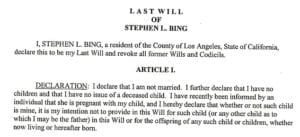Steve Bing, a wealthy Hollywood movie investor, committed suicide earlier this year in Los Angeles. Now, the Daily Mail reports that issues of paternity and a possible challenge to the disinheritance of any children are brewing in California probate court.
As reported by the Daily Mail, Kira Kerkorian has submitted a DNA test stating that she is Bing’s biological child. Bing died with a 2001 will disinheriting any children he may have had, and with a Trust naming The Clinton Foundation as its sole beneficiary.
The Daily Mail reports that Kira obtained DNA from Bing’s body in the morgue, “signaling Kira’s plans to contest the will” and has asked to oversee the estate. It is also reported that Bing was first revealed as Kira’s father in a legal dispute between Kira’s mom and her ex-husband, billionaire Kirk Kerkorian.
Can You Establish Paternity After Death In California?
Yes, paternity can be established by clear and convincing evidence in California Probate court. California Probate Code section 6453 states:
For the purpose of determining whether a person is a “natural parent” as that term is used in this chapter:
(a) A natural parent and child relationship is established where that relationship is presumed and not rebutted pursuant to the Uniform Parentage Act (Part 3 (commencing with Section 7600) of Division 12 of the Family Code).
(b) A natural parent and child relationship may be established pursuant to any other provisions of the Uniform Parentage Act, except that the relationship may not be established by an action under subdivision (c) of Section 7630 of the Family Code unless any of the following conditions exist:
(1) A court order was entered during the parent’s lifetime declaring parentage.
(2) Parentage is established by clear and convincing evidence that the parent has openly held out the child as that parent’s own.
(3) It was impossible for the parent to hold out the child as that parent’s own and parentage is established by clear and convincing evidence, which may include genetic DNA evidence acquired during the parent’s lifetime.
(c) A natural parent and child relationship may be established pursuant to Section 249.5.
What Happens If Paternity Is Established?
Sometimes a child can be considered an omitted child under California law if they were born after the execution of decedent’s testamentary documents. However, in certain circumstances even an omitted child still receives nothing from the California probate estate, which we have written about here.
Here, the will has the following clause regarding children:

In another case we recently wrote about – see General Disinheritance Clause Defeats Omitted Child Claim Under California Probate Code – the California appellate court determined that a general disinheritance clause can defeat an omitted child claim for unknown children born before the execution of a will or trust. Here, it appears that Kira was in utero at the time that Bing executed the will.
Can a general disinheritance clause disinherit children not yet born? One of the circumstances set forth by the California Probate Code where an omitted child does not receive a share of the estate is when Decedent’s failure to provide for the child was intentional AND that intention appears from the testamentary instruments.
Certainly the argument can be made that a disinheritance declaration or clause with explicit language that “it is my intention not to provide in this Will for such child (or any other child as to which I may be the father) in this Will or for the offspring of any such child or children, whether now living or hereafter born,” is an intentional statement not to provide for any child or future children.
Time will tell how the determination as to paternity and the ultimate disposition of Steve Bing’s California probate estate is impacted.



